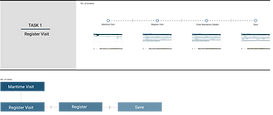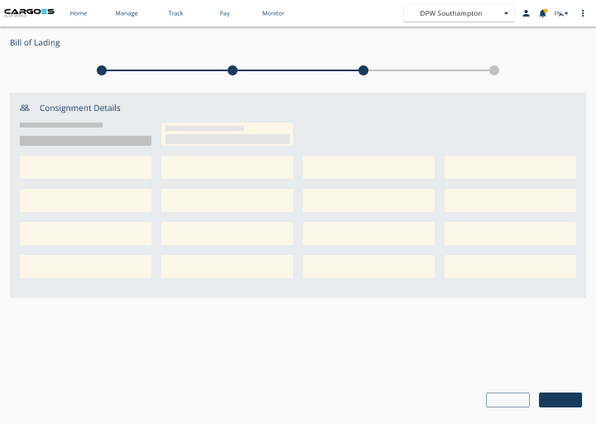
Voyage and Manifest, DP World
Project Timeline: 2 years 4 months (Completed in three phases)
Team: Designer (Individual), Product Owner and Business Analyst
Year of Completion: June 2023
Role: UX Researcher, UX Design, Business Analysis
Software Development Team (Front and Back end), Clients
Status: The products were live across 12+ ports with expansion plans as of January 2024.
Overview
Tracking of vessels and its contents are carried across the globe. Voyage and Manifest comprehensive product which provides visibility to various stakeholders (shipping lines, importers & exporters, custom agents, etc.) to track the Import and Export of products from a port. This enables the companies to be able to perform actions for the release of containers out from port for final delivery.
This module was developed in three phases:
-
Vessel Visit (Movement of Vessel across ports)
-
Import Manifest ( Tracking the Containers and Cargoes coming into the Port)
-
Export Manifest (Tracking of Containers and Cargoes going out of the Port)
Product Initiation
As the user experience designer, this initiated with a detailed understanding of the existing products across the various platforms (UK, UAE and India) and along with reframing the business and product requirements and create uniform and easy to use product globally.
This analysis was divided into three parts:
1
Heuristic Evaluation
Evaluated the existing platform with Quantitative and Qualitative analysis to understanding the key factors of the website with Google Analytics and these measures.
-
Usability Issue
-
Page Layout & Design
-
Navigation, IA & Interaction
-
Forms, Function & Data Input
-
Visual & Branding
-
Labeling & Content
-
Generic Observations


Screen Samples
2
AS- IS Flow
Representing the analysis from the heuristic evaluation and translating the existing flows of various business use cases across various platforms of DP World globally.
This helped in understanding the gaps in the current flow and assessing the user need and business viability.


Current flow across platforms
3
To-Be Flows
Based on the insights and usability recommendations through customer requirements and business needs, proposed user flows were created for various stakeholder personas (based on the primary and secondary user)
This user flow was co-designed with the business leads across UK, UAE and India. Once the user flows were finalized low fidelity designs were proposed.

Proposed Flows Iterations
User Personas
Phase 1: Vessel Visit
Design Iterations: Low Fidelity
Based on the finalization of the user flow, we created low fidelity designs proposals for Product 1 (Vessel Visit)
-
Reduced the number of steps to register a vessel movement (visit) and made it more efficient
-
Added multiple steps to enable users to register a new vessel in the same process.
-
Easy tracking and management of the existing visit.
-
Based on user privileges, manual changes on the visit can be performed.
Low Fidelity Wireframes: Working with the options to simplify the navigation of multi-layered product
Design Iterations: Mid Fidelity
The next set of iterations were based on the finalization of form fields and the segregation of fields into their sub product categories.
-
Vessel Visit has sub products like, Vessel and Scheduling which can be used for multiple voyages by shipping lines and shipping agents.
-
Easier reach to these sub-products for repeat usage.
-
Reducing the number of fields in each step to make the form less daunting.
Mideum Fidelity Wireframes: Working to group the form fields with setting a language using design system elements
Final Designs




Phase 2: Import Manifest
Overview
Based on iterations of the Vessel Visit, this product facilitates the management of an incoming journey (Import Voyage) to a port. It provides a comprehensive view of the voyage for various stakeholders, including shipping lines, shipping agents, and customs. The system is designed to support different use cases related to track and account different types of containers or partial shipments (cargo and consignments) based on the content type.
Phase 3: Export Manifest
Overview
Based on iterations of the Import Manifest, this product facilitates the management of an outgoing journey (Export Voyage) from a port. It provides a comprehensive view of the voyage for various stakeholders, including shipping lines, clearing agents, and customs. The system is designed to support different use cases related to retrieving containers or partial shipments (cargo and consignments) from the port.




















